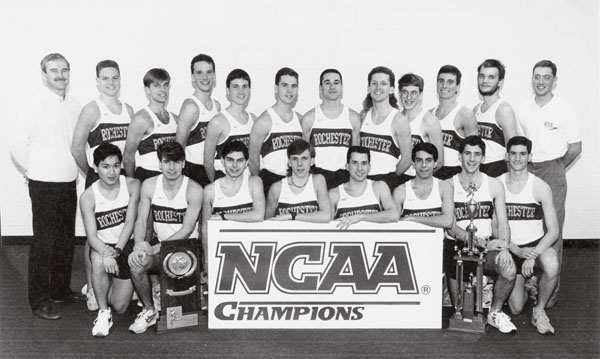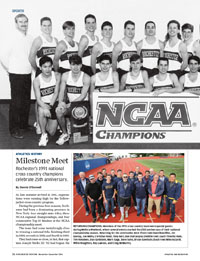In Review
 CHAMPIONS! The Yellowjackets won the cross country national championship in 1991, capping off a stretch in the late 1980s
and early 1990s when the team finished among the top 10 in the country five years in a row. (Photo: Athletics and Recreation)
CHAMPIONS! The Yellowjackets won the cross country national championship in 1991, capping off a stretch in the late 1980s
and early 1990s when the team finished among the top 10 in the country five years in a row. (Photo: Athletics and Recreation)As late summer arrived in 1991, expectations were running high for the Yellowjacket cross country program.
During the previous four seasons, Rochester had been a dominating presence in New York: four straight state titles, three NCAA regional championships, and four consecutive Top 10 finishes at the NCAA championship meet.
The team had come tantalizingly close to winning a national title, finishing third in 1988, seventh in 1989, and fourth in 1990.
They had come so close, in fact, that captain Joseph Mello III ’92 had begun the season by predicting big things for the talented and experienced team. But he had seen firsthand how challenging it could be to win it all.
“It takes talent and hard work to get the opportunity to fight for that spot,” Mello says, “but the difference between first and fourth at the highest levels is razor thin, and you need a break.”
After a season of winning nearly every meet on their schedule, the Yellowjackets realized that the finishing order of the NCAA championship meet had turned into a cliffhanger.
As finishers crossed the line, race officials tore a slip of paper from each runner’s jersey and used that information to sort the results. The racers were given a piece of paper that noted their finishing order.
But the results wouldn’t be official until the NCAA extracted the information for all 185 runners.
“Right after the race, we were very worried,” says Ray Lawson ’92.
 RETURNING CHAMPIONS: Members of the 1991 cross country team were special guests during Meliora Weekend, where several events
marked the 25th anniversary of their national championship season. Returning for the ceremonies were (front row) Dave Boutillier,
Jim Dunlop, Joe Mello, Christian Reed, Tony Kerr, Don Dalrymple; (middle row) coach Timothy Hale, Tim Voloshen, Dan Goldstein,
Mark Gage, Dave Sullo, Bryan Goettsch; (back row) Mike Accardi, Willie Houghton, Ray Lawson, and Craig McMurtry. (Photo: Athletics and Recreation)
RETURNING CHAMPIONS: Members of the 1991 cross country team were special guests during Meliora Weekend, where several events
marked the 25th anniversary of their national championship season. Returning for the ceremonies were (front row) Dave Boutillier,
Jim Dunlop, Joe Mello, Christian Reed, Tony Kerr, Don Dalrymple; (middle row) coach Timothy Hale, Tim Voloshen, Dan Goldstein,
Mark Gage, Dave Sullo, Bryan Goettsch; (back row) Mike Accardi, Willie Houghton, Ray Lawson, and Craig McMurtry. (Photo: Athletics and Recreation)Coach Tim Hale, accompanied by former Yellowjacket runners Dick Keil ’83 and Tom Tuori ’87, had scrambled to tabulate results, but Hale wasn’t sure he had more than a rough sense of how Rochester had done.
Adding to the team’s anxiety, Chris Rizzo ’93 had collapsed in the finish chute and had to be treated for heat exhaustion.
Mello and others began to doubt whether they had the title. “I remember finishing and starting to count informal scores and thinking we just missed again. The unofficial scores looked like we finished second or worse.”
In the final tally, Rochester had edged out three-time defending national champion Wisconsin-Oshkosh and pushed ahead of surprise challenger North Central of Illinois to claim the top spot.
The margin of victory was the closest in what was then the 19-year history of the national meet. Rochester finished with 139 points, eight ahead of North Central and 11 more than Wisconsin-Oshkosh.
Three Yellowjackets—Jim Dunlop ’92, Dave Boutillier ’92, and Mello—earned All-America honors. Dunlop was the national individual runner-up. Mello was 10th overall, and Boutillier was 17th. Joining them at the finish line were Anthony Kerr ’93 in 44th and Lawson in 67th.
It was the first national title for Rochester in cross country, a milestone that was recognized during Meliora Weekend in October. Among those honored was Hale, who says the team understood the expectations placed on them but also knew that they couldn’t take anything for granted.
“We enjoyed the respect that coaches across the country had for us, but we also knew the last day of the season would be the final say,” he says.
For Mello, “On that day, I felt the pressure go. I felt we finally carried that baton across the line, a process that started years before I ever showed up on campus. I have never forgotten the role we played, and the road those before us paved that gave us that opportunity.”
Mello says he’s proud to have been part of something “greater than I could have ever imagined,” the culmination of years of hard work, dedication, sacrifice, and training. But he also recognizes the luck, timing, and fortune that were in the right place at the right time—“with the right people.”
Dennis O’Donnell is director of communications for the Department of Athletics and Recreation.

